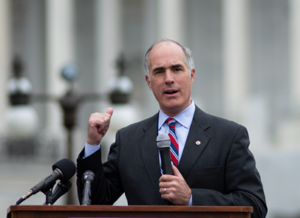
A group of Senators is urging the Centers for Medicare & Medicaid Services to proceed as quickly as possible with setting a minimum staffing mandate for nursing homes. In a nod to skilled care operators, the seven Democrats also urged the agency to look at how a new rule would impact providers with a “more limited workforce.”
Led by Sen. Bob Casey (D-PA), the senators said they “appreciate” CMS’ work to date “to promote safety and quality” throughout the sector. However, the vagueness of federal regulations requiring 24-hour, licensed nursing care proved “insufficient” during the pandemic.
“Studies have shown a correlation between inadequate staffing levels and lower quality of care,” said the letter to CMS Administrator Chiquita Brooks-LaSure
On Feb. 29, 2022, the White House released a 21-point reform plan that hinges on the first-ever, federal staffing mandate for nursing homes. After nearly a year of study and analysis, sector observers are waiting for the proposed rule to be released.
The letter acknowledged that facilities in rural and other underserved areas may have trouble complying with a mandate and suggested CMS take that into consideration.
“We also urge CMS to take all steps possible to ensure that nursing facilities have the financial resources to comply with, if not exceed, any potential minimum standards,” the letter stated. “Finally, we urge CMS to consider the availability of sufficient workforce for nursing facilities to comply with potential minimum staffing standards. We have heard from nursing facilities in our states that are experiencing shortages of direct care staff who remain concerned by the potential that compliance with minimum staffing requirements may not be feasible given the current staffing situation.”
Casey chairs the Senate Special Committee on Aging and has long supported minimum staffing requirements, ostensibly to improve the quality of care for nursing home residents. Other signers of the letter are Sen. Ron Wyden (D-OR), chair of the Senate Committee on Finance, Sen. Richard Blumenthal (D-CT), Sen. Cory Booker (D-NJ), Sen. Sherrod Brown (D-OH), Sen. Kirsten Gillibrand (D-NY), and Sen. Elizabeth Warren (D-MA).
The letter comes three weeks after another letter from 13 senators — a bipartisan group from Arizona, Colorado, South Dakota, West Virginia and others — asking CMS to hit the brakes on any federal staffing mandates for fear that it would imperil rural nursing homes.
“We fear a one-size-fits-all staffing mandate would undermine access to care for patients, particularly in rural communities,” read the letter led by Sen. Jon Tester (D-MT). “Additionally, blanket staffing standards may not provide enough flexibility to nursing homes in light of well-known and longstanding obstacles to the recruitment and retention of direct care workers, especially in rural and underserved areas.”
Tester also bluntly tweeted, “Most folks in DC don’t get rural America, so it’s my job to stand up to bureaucrats that try to impose one-size-fits-all solutions on Montana.”
The two largest nursing home advocacy groups have weighed in on staffing mandates, emphasizing that the sector is experiencing an existential crisis.
“Achieving the shared goal of ensuring quality care in nursing homes nationwide is a complex undertaking,” said Ruth Katz, senior vice president of Policy at LeadingAge, in a statement to McKnights Long-Term Care News Friday. She added that without addressing adequate reimbursements and labor shortages, “staffing mandates are impossible.”
The American Health Care Association released a study last year indicating that a federal staffing requirement would cost up to $10 billion per year and require hiring more than 187,000 new workers. In commenting to McKnights Friday on the senators’ letter, AHCA Senior Vice President of Government Relations Clif Porter noted that 96% of nursing homes have workforce problems and more than half are operating in the red.
“We appreciate that these Democratic Senators wish to increase the nursing home workforce — we share in that desire,” Porter said. “But federal staffing mandates as we slowly recover from a historic pandemic and labor crisis is not how you accomplish these goals. We hope to work with the Administration and Congress on more meaningful steps to help rebuild our long-term care workforce.”



